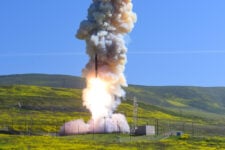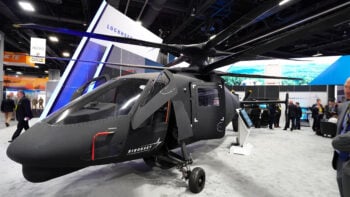
An Anduril Sentry Tower as part of its counter-unmanned system capability. (Courtesy of Anduril)
WASHINGTON: Anduril Industries won its largest contract to date last week, a nearly $1 billion contract with Special Operations Command, in a victory that highlights the high-dollar potential that nontraditional contractors can have in a military contracting system usually dominated massive corporations.
“This is hugely significant in that it sends a signal that start ups and non-traditional companies can actually succeed in the federal marketplace,” said Bill Greenwalt, former deputy undersecretary of defense for industrial policy and current nonresident senior fellow at the American Enterprise Institute.
Anduril will serve as a systems integrator partner on SOCOM’s counter-unmanned systems efforts. The contract is worth a maximum of $967,599,957 over the next the decade. Under the contract, SOCOM will be able to purchase Anduril’s systems through traditional means, in addition to buying Anduril’s products as a service, meaning the command can configure the system “based on mission profiles and ensuring SOCOM can rapidly adapt to new and evolving threat profiles.”
Related: Silicon Valley warns the Pentagon: ‘Time is running out’
According to the company press release, the company will “deliver, advance, and sustain CUxS capabilities for special operations forces wherever they operate.” It will provide counter-drone capability through its Lattice AI platform, which is designed to autonomously identify and classify threats. The system will be deployed both domestically and overseas, the Jan. 20 announcement stated.
Anduril has made major strides in the last year positioning itself to win major defense contracts and augment its technology portfolio. Last year, it acquired Area-I, a tube-launched unmanned aerial system maker. Last summer, the company won a five-year, $99 million production other transaction agreement with the Pentagon’s Defense Innovation Unit for its counter-drone tech.
In September, it bought Copious Imaging, whose technology added another layer of threat detection to Anduril’s air defense portfolio.
Arundil took on 11 other competitors for the latest contract win, according to the DoD.
“The evolving unmanned aerial threat requires flexible, adaptable, and rapidly deployable technology approaches,” said Brian Schimpf, Anduril co-founder and CEO, in a statement. “With the Lattice CUxS family of systems, Anduril is well-equipped to deliver the solutions SOCOM needs today and in the future.”
While Anduril may serve as a posterchild for the potential success startups can have in the federal marketplace, Greenwalt noted that SOCOM traditionally is better than the other services at harnessing innovation and other services still need to improve.
“It is no surprise that this award came from SOCOM which has been the most forward-leaning entrepreneurial segment of the Department of Defense for the past several decades,” Greenwalt said. “Taking risks and choosing what is best for soldiers, sailors, airmen, and Marines seems to be embedded in the SOCOM culture.”
He lamented, however, that that “culture is not yet ingrained in the larger military services that are highly risk-averse and have been poor partners for startups and non-traditional firms who might propose and develop revolutionary technological solutions.”
Breaking Defense previously reported that for the Pentagon, “time is running out with Silicon Valley,” as Katherine Boyle, a partner with venture capital firm Andreessen Horowitz, put it in a tweet, echoing industry executives frustrated with how difficult it is to do business with the big military.
“People are watching. Is this an area where people can actually make big money?” Joe Lonsdale, managing partner at the 8VC venture capital group and a founder of Palantir, asked during a Dec. 4 panel at the Reagan Defense Forum. “So far, we haven’t seen big wins.”
It remains to be seen if Anduril’s contract signals a broader turning of the tide.
Major trends and takeaways from the Defense Department’s Unfunded Priority Lists
Mark Cancian and Chris Park of CSIS break down what is in this year’s unfunded priority lists and what they say about the state of the US military.


























